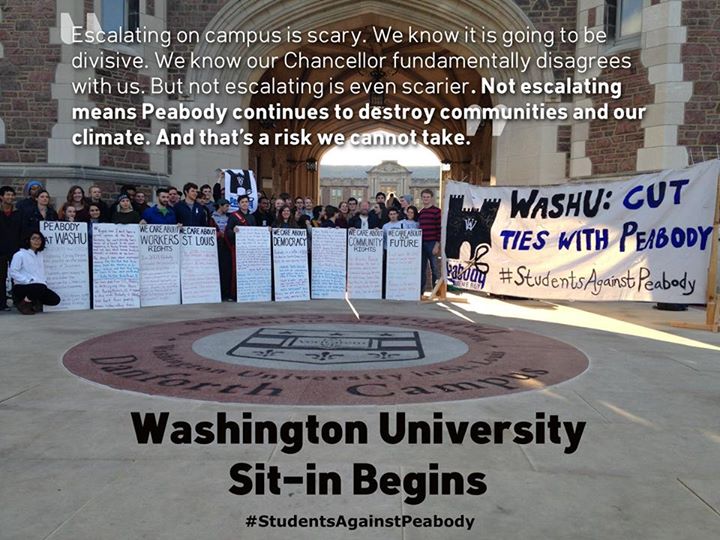It’s a busy week in the campus fossil fuel divestment movement.
A “sit in” by students at the Washington University of St. Louis enters its third day today. The protestors have camped out underneath their campus’s Brookings Archway since Tuesday, demanding that the school cut ties with Peabody Energy — the world’s largest private coal company — and its CEO Greg Boyce.
Boyce was named to WU‘s Board of Trustees in 2009. One year earlier, Peabody gave the university millions of dollars to help create the Consortium for Clean Coal Utilization. (Along with Arch Coal, who also kicked in, the investment was roughly $5 million.)
According to Caroline Burney, a senior at Washington University, the sit-in only became necessary after many other attempts for dialogue with the school’s administration were exhausted. Burney writes:
Peabody Energy CEO Greg Boyce also holds one more distinction: member of the Washington University Board of Trustees. Since Boyce was placed on the board in 2009, students have been actively organizing against Peabody Energy’s presence on campus. We have demanded that Boyce be removed from the Board of Trustees and that the University change the name of the “Consortium for Clean Coal Utilization,” a research entity to which Peabody and Arch Coal donated $5,000,000. We have met with the Chancellor – multiple times. We have dropped banners at coal events, peacefully disrupted speeches by Greg Boyce on campus, marched through campus and taken our demands to Peabody’s headquarters. We have protested with residents from Black Mesa, collected signatures for the Take Back St. Louis ballot initiative and rallied with the United Mine Workers in their fight against Peabody.
But, five years later, Boyce is still on the board, the name of the Clean Coal Consortium remains unchanged, and Chancellor Wrighton continues to stand behind Peabody Energy. Indeed, just this week he emailed us saying, “your opinion that peabody energy behaves in an ‘irresponsible and unjust manner’ is not one that I share.” The Administration has successfully used a “deny by delay” process by holding town hall meetings and developing task forces around renewable energy and energy efficiency while ignoring the role that coal plays on the campus.
In a powerful editorial for Student Life, the independent newspaper of Washington University of St. Louis, staff writer Aaron Hall echoes the students’ frustrations, and lays out the stakes of the action:
So what can the divestment movement do to cut Wash. U’s affiliation with this robber baron? The answer is that it has done as much as it can so far. It has the public’s attention and has made clear actions to open dialogue with the administration. Unfortunately, the board of trustees keeps Wash. U.’s financials well-hidden from the eyes of its students. So the divestment movement’s first goal is to increase financial transparency so we can see to what extent Peabody funds our school. Secondly, it requests that Boyce be removed from the board of trustees, primarily for the blatantly unethical worker treatment that occurred under his leadership. What does it take for the administration to address this civil and reasonable request? If a sit-in isn’t enough, then I don’t know what is.
Here’s video of the sit-in by Student Life, the student newspaper of Washington University of St. Louis.
Meanwhile, in Cambridge, Massachusetts, student and alumni advocates for divestment at Harvard University have been joined by a powerful faction: their teachers. On Thursday morning, nearly 100 faculty members published an open letter to President Drew Faust and the University’s Fellows, expressing frustration with the president’s dismissive statements on divestment, and demanding that the University “divest, as soon as possible, its holdings in fossil fuel corporations.”
Divestment is an act of ethical responsibility, a protest against current practices that cannot be altered as quickly or effectively by other means. The University either invests in fossil fuel corporations, or it divests. If the Corporation regards divestment as “political,” then its continued investment is a similarly political act, one that finances present corporate activities and calculates profit from them.
You can read the letter in its entirety here.
Subscribe to our newsletter
Stay up to date with DeSmog news and alerts








